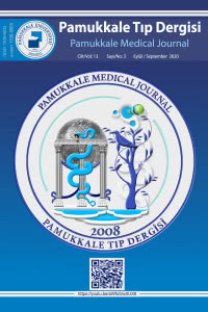Ramazan ayında akut pankreatit sıklığı azalıyor mu?
Pankreatit, Acil tıp, Karın ağrısı
Does the frequency of acute pancreatitis decrease in Ramadan?
Pancreatitis, Emergency medicine, Abdominal pain,
___
- 1. Otsuki M, Takeda K, Matsuno S, Kihara Y, Koizumi M, Hirota M. et al. Criteria for the diagnosis and severity of acute pancreatitis. World J Gastroenterol, 2013; 19: 5798–805. doi: 10.3748/wjg.v19.i35.5798
- 2. Slawinski C, O'Reilly DA. Management of acute pancreatitis: a practical guide. Br J Hosp Med (Lond), 2017; 78: C171–5. doi:10.12968/hmed.2017.78.11.C171
- 3. Besselink M, van Santvoort H, Freeman M, et al. (Working Group IAP/APA Acute Pancreatitis Guidelines). IAP/APA evidence-based guidelines for the management of acute pancreatitis. Pancreatology, 2013; 13: e1–e15. doi:10.1016/j.pan.2013.07.063
- 4. Abbas SM, Basalamah AH. Effects of Ramadhan fast on male fertility. Arch Androl, 1986; 16: 161–6. doi:10.3109/01485018608986937
- 5. Tenner S, Baillie J, DeWitt J, Vege SS. American College of Gastroenterology. American College of Gastroenterology guideline: management of acute pancreatitis. Am J Gastroenterol, 2013; 108: 1400-15; 1416. doi:10.1038/ajg.2013.218
- 6. Banks PA, Bollen TL, Dervenis C, Gooszen HG, Johnson CD, Sarr MG, et al. Classification of acute pancreatitis--2012: revision of the Atlanta classification and definitions by international consensus. Gut, 2013; 62: 102–11. doi:10.1136/gutjnl-2012-302779
- 7. Fagenholz PJ, Castillo CF, Harris NS, Pelletier AJ, Camargo CA Jr. Increasing United States hospital admissions for acute pancreatitis, 1988–2003. Ann Epidemiol, 2007; 17: 491–7. doi:10.1016/j.annepidem.2007.02.002
- 8. Arif A, Jaleel F, Rashid K. Accuracy of BISAP score in prediction of severe acute pancreatitis. Pak J Med Sci, 2019; 35: 1008–12. doi: 10.12669/pjms.35.4.1286
- 9. Talukdar R, Vege SS. Recent developments in acute pancreatitis. Clin Gastroenterol Hepatol, 2009; 7: S3–9. doi:10.1016/j.cgh.2009.07.037
- 10. Lecesne R, Taourel P, Bret PM, Atri M, Reinhold C. Acute pancreatitis: interobserver agreement and correlation of CT and MR cholangiopancreatography with outcome. Radiology, 1999; 211: 727–35. doi:10.1148/radiology.211.3.r99jn08727
- ISSN: 1309-9833
- Yayın Aralığı: Yılda 4 Sayı
- Başlangıç: 2008
- Yayıncı: Prof.Dr.Eylem Değirmenci
Bir halk sağlığı sorunu: çocuk sağlığı izleminde D vitamini
Gökçe CELEP, Zeynep Hülya DURMAZ
Ramazan ayında akut pankreatit sıklığı azalıyor mu?
Mert ÖZEN, Atakan YILMAZ, Muhammed Raşid AYKOTA, Mert ÖZEN
Tümör nedeniyle toraks duvar rezeksiyonunda morbiditeyi etkileyen faktörler
Kronik aktif gastritli çocuklarda çölyak arter kan akımının değerlendirilmesi
Mehmet Burak Özkan, Ulaş Emre Akbulut, İshak Abdurrahman Işık, Atike Atalay
Hekimlerin sosyal iletişim becerileri
Emine DEMİR, Emre EKMEKCİ, Sefa KELEKCİ
Akkiz punktum stenozunda tanı, etyoloji ve tedavi seçenekleri
HPV-16/18 pozitif kadınların takibinde kolposkopi eşliğinde alınan servikal biyopsinin önemi
Soner GÖK, Berfin Can GÖK, Deniz Aydın CEYLAN
Çocukluk çağı aşılarına yönelik ebeveyn tutumları ölçeğinin Türkçeye kültürel ve dil uyarlaması
İrem AKDEMİR KALKAN, Meryem ÖREN, TUBA DAL, Yeşim YILDIZ, Yakup DEMİR, Ömer KARAŞAHİN, Fesih AKTAR, Selim BADUR, Merve AYHAN, Mustafa Kemal ÇELEN
Multiple skalp ve ekstremite yerleşimli aplazia kutis konjenita
